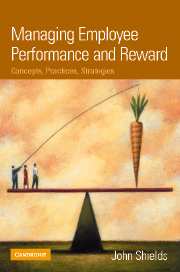Book contents
- Frontmatter
- Contents
- List of figures and tables
- Foreword by John Egan
- Acknowledgements
- Introduction: Setting the scene
- Part 1 The fundamentals
- Part 2 Performance management in action
- 5 Managing for results
- 6 Managing behaviour
- 7 Managing competencies
- 8 Performance review and development
- Case study. Delivering fairness: Performance assessment at Mercury Couriers
- Part 3 Base pay and benefits
- Part 4 Rewarding employee performance
- Part 5 Fitting it all together
- Model responses to case studies
- References
- Index
Case study. Delivering fairness: Performance assessment at Mercury Couriers
from Part 2 - Performance management in action
- Frontmatter
- Contents
- List of figures and tables
- Foreword by John Egan
- Acknowledgements
- Introduction: Setting the scene
- Part 1 The fundamentals
- Part 2 Performance management in action
- 5 Managing for results
- 6 Managing behaviour
- 7 Managing competencies
- 8 Performance review and development
- Case study. Delivering fairness: Performance assessment at Mercury Couriers
- Part 3 Base pay and benefits
- Part 4 Rewarding employee performance
- Part 5 Fitting it all together
- Model responses to case studies
- References
- Index
Summary
Mercury Couriers is a capital-city-based mid-sized firm that employs 600 people in its rapidly growing commercial parcel collection and distribution business, which it has operated successfully throughout Australia since the firm's establishment seven years ago. The firm has separate departments covering customer service, parcel collection and distribution, vehicle maintenance, accounts, legal, marketing and human resources. Most of its line employees and supervisors work in customer call centres, distribution centres and vehicle maintenance facilities located strategically across the country. The firm could best be described as having a cost-defender competitive strategy, a mechanistic organisational structure and a traditional management culture.
Don Cobb, Mercury's human resources manager, is proud of his and the firm's achievements. When it comes to people management, Don's approach is down-to-earth and pragmatic. Previously a despatch driver himself, Don has little time for managers who spend their time reading the latest management books, chasing university degrees or agonising about the options for ‘best practice’ people management. Don also believes in ‘buying’ rather than ‘building’ skilled staff. In-house training and development, he says, is just a waste of everyone's time – and of the firm's money.
He is especially proud of the one-page form that he has designed for use in the firm's once-a-year performance assessment round. The form, which is reproduced below, is applied to all of Mercury's non-managerial employees, including call centre staff, parcel despatch people, drivers, vehicle maintenance workers and administration staff.
- Type
- Chapter
- Information
- Managing Employee Performance and RewardConcepts, Practices, Strategies, pp. 227 - 230Publisher: Cambridge University PressPrint publication year: 2007

